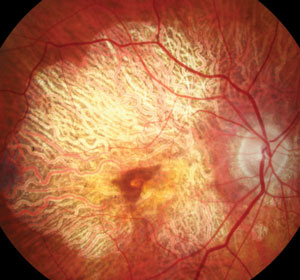Researchers recently discovered that those who consume higher amounts lutein/zeaxanthin—found in red, yellow, orange and dark green fruits and vegetables—have a reduced risk of developing advanced age-related macular degeneration (AMD). Using data from the Nurses’ Health Study, conducted from 1984 to 2010, and the Health Professionals Follow-up Study, conducted from 1986 to 2010, they studied a total of 102,046 patients aged 50 and older without AMD, diabetes mellitus, cardiovascular disease or cancer at baseline.
 | |
| Central geographic atrophy seen in a patient with AMD. Photo: Jay Haynie, OD. |
They determined predicted plasma carotenoid scores using repeated food frequency questionnaires. The medical record review revealed 1,361 intermediate and 1,118 advanced AMD cases (primarily neovascular AMD) with a visual acuity of 20/30 or worse.
The results showed a nearly 40% risk reduction for advanced AMD in both women and men when comparing extreme quintiles of predicted plasma lutein/zeaxanthin score. For predicted carotenoid scores such as β-cryptoxanthin, α-carotene and β-carotene, they found a 25% to 35% lower risk of advanced AMD.
Encouraging the public to eat more fruits and vegetables rich in carotenoids may reduce the incidence of advanced AMD, the researchers concluded in the study.
“Yet the public may not benefit, if retinal health, macular pigment status and nutrition research is not transmitted directly to each patient by their optometrist, so patients know that they are at risk and how to help themselves,” says Stuart Richer, OD, PhD, president of the Ocular Nutrition Society. “It is easier to fix the roof before a snow storm, and optometrists are in the unique position to inform patients that they actually have early age-related macular degeneration and/or are low in macular pigment.”
Wu J, Cho E, Willett W, et al. Intakes of Lutein, Zeaxanthin, and Other Carotenoids and Age-Related Macular Degeneration During 2 Decades of Prospective Follow-up. JAMA Ophthalmol. October 08, 2015. [Epub ahead of print].
